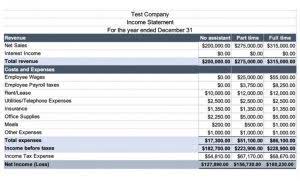
Revenue recognition is a critical aspect of financial reporting that differs gaap vs ifrs income statement significantly between IFRS and GAAP. Under IFRS, revenue is recognized based on the transfer of control of goods or services to the customer, which may occur over time or at a point in time. This approach focuses on the satisfaction of performance obligations in contracts. As the world of finance becomes more global, the importance of GAAP (Generally Accepted Accounting Principles) and IFRS (International Financial Reporting Standards) for financial reporting is growing. US GAAP is crucial in the American business landscape, ensuring the accuracy of financial reports and enabling stakeholders to understand a company’s financial position. The IFRS statements consist of a statement of the comprehensive income statement of financial position, statement of cash flows, statement of changes in equity, and notes.

What are the international financial reporting standards
While both types of leases must be recognized on the balance sheet, operating leases do not affect the income statement in the same manner as finance leases. This distinction can lead to variations in reported expenses and profitability between IFRS and GAAP. Differences in asset revaluation and research costs are starting to align. This change is good for comparing companies and boosts investor confidence. The efforts of the IASB and FASB in refining these standards show a commitment to high-quality financial reporting. This work is key to maintaining trust and accountability in global finance.
- The Financial Accounting Standards Board (FASB) was established in 1973 to further refine these standards, leading to the detailed framework of GAAP used in the U.S. today.
- These differences affect financial analysis, influencing decisions and comparisons across various reporting standards.
- One of the key distinctions between IFRS and GAAP lies in their underlying principles.
- IFRS focuses on the concept of control, requiring entities to consolidate all subsidiaries where control is established, regardless of the equity stake.
- The Securities and Exchange Commission won’t switch to International Financial Reporting Standards in the near term but will continue reviewing a proposal to allow IFRS information to supplement U.S. financial filings.
- There are some key differences between how corporate finances are governed in the US and abroad.
Audit vs Non-Audit Services: Difference and Comparison
- In the late 19th century, the need for standardized accounting practices became apparent as industrialization led to the growth of large corporations.
- While both sets of standards aim to provide accurate and reliable financial information, they have different approaches and guidelines.
- In contrast, IFRS adopts a more principles-based approach under IFRS 15, which also follows a five-step model similar to GAAP’s ASC 606.
- IFRS 15 also uses a five-step model for revenue recognition, similar to ASC 606.
Exploring the critical distinctions between GAAP vs IFRS is crucial for anyone involved in business finance, as they shape the presentation and interpretation Interior Design Bookkeeping of financial statements worldwide. When comparing IFRS and GAAP, recognize the differences in principles, valuation methods, revenue recognition criteria, treatment of inventory, and financial statement presentation. IFRS leans towards fair value asset valuation, while GAAP relies more on historical cost. Variations in revenue recognition timelines exist, impacting financial statement interpretation. Inventory handled differently, with GAAP allowing LIFO and FIFO methods.

IFRS vs US GAAP on the Financial Statements (21:

The differences in impairment testing methodologies can lead to significant variations in the timing and amount of impairment losses recognized under GAAP and IFRS. Ramp’s AI-suggested accounting rules detect patterns in expense categorization and recommend standardized classifications, ensuring transactions are consistently coded across the company. This helps maintain compliance with IFRS principles like substance over form and faithful representation, allowing businesses to trust that their financial data is categorized correctly every time. Comprehensive income includes all changes in equity during a period except those resulting from investments by owners and distributions to owners.
- These are just a few of the many differences between IFRS and GAAP, highlighting their varying approaches to accounting standards and practices.
- GAAP does not allow for inventory reversals, while IFRS permits them under certain conditions.
- IFRS promotes listing assets by how quickly they can be turned into cash.
- Like US GAAP, the income statement captures most, but not all, revenues, income and expenses.
- IFRS requires many financial assets and liabilities to be reported at fair value, which means their current capital market price rather than historical cost.
- Non-GAAP financial measures (NGFMs) – also sometimes referred to outside the United States as alternative performance measures – are not defined in IFRS.
Despite these efforts, full convergence has not yet been achieved, and some areas, such as revenue recognition and lease accounting, still exhibit differences. Companies operating globally often need to prepare dual financial statements to comply with both standards. The convergence of International Financial Reporting Standards (IFRS) and Generally Accepted Accounting Principles (GAAP) has been a significant focus for global financial regulators and standard-setters.


The two main sets of accounting standards followed by businesses are GAAP and IFRS. For professionals in non-accounting roles, what are retained earnings understanding what’s behind an organization’s numbers can be immensely valuable. Knowing how to analyze financial statements can improve your ability to communicate results and boost collaboration with colleagues in more numbers-focused positions. Adopting IFRS also brings operational advantages by improving financial accuracy, risk management, and decision-making. Companies that embrace automation in their accounting workflows can simplify compliance, reduce manual errors, and accelerate financial reporting. While IFRS is the global standard, GAAP remains the dominant framework in the United States.
